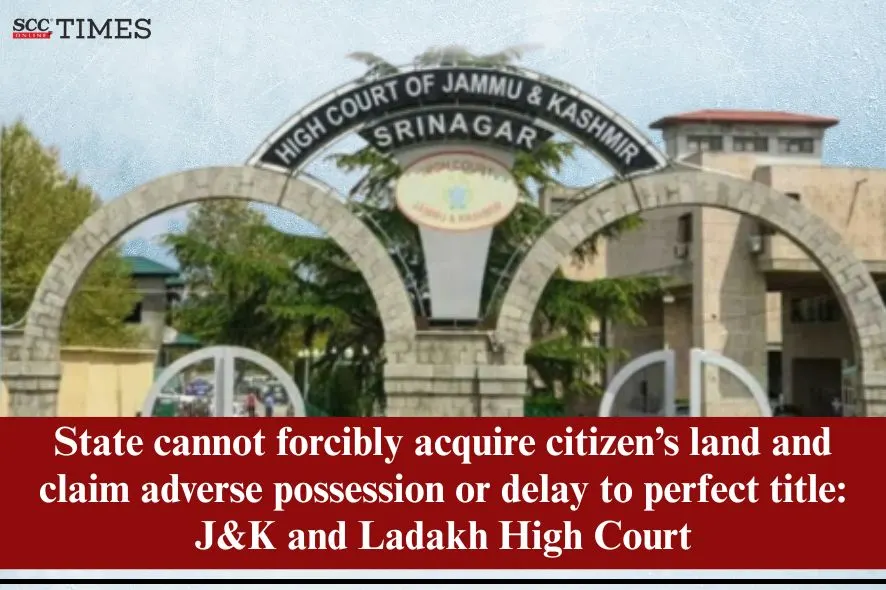Jammu & Kashmir and Ladakh High Court: An intra-Court appeal was filed by landowners (‘appellants’) challenging the dismissal of their writ petition by the Single Judge, which had sought compensation for 8 kanals and 13 marlas of land. The petition was dismissed on grounds of delay and laches.The Division Bench of Sanjeev Kumar* and Sanjay Parihar, JJ., held that the State could not be permitted to invoke the doctrine of adverse possession to legitimise forcible and unauthorised occupation of private land and directed the State to initiate the process of acquisition in accordance with the law and determine the compensation payable to the appellants.
Background
The predecessor-in-interest of the appellants was the owner in possession of subject land which devolved upon them after his demise. As per the revenue records, the owners of the land were the appellants, but the physical possession was with the Rural Development Department (‘RDD’) The possession was taken over by RDD prior to 1958-1959 for construction of Block building in Bandipora without following any due process of law and without payment of any compensation. No claim was put forward by the predecessor-in-interest either regarding illegal possession or compensation.
In 2013, the appellants approached the Deputy Commissioner, Bandipora seeking compensation for land under occupation of the RDD. The Assistant Commissioner was called upon to take up the matter with the Director, RDD, and he requested the Director to release funds to pay the compensation. The Director forwarded the matter to the Administrative Department of Rural Development and Panchayati Raj, which put forward a few queries that were replied to by the Assistant Commissioner. Ultimately, the compensation was denied to the appellants and thus they filed the writ petition seeking direction to the State to formally acquire the land and pay them compensation at market rates and return the major portion of the land which was not in actual use of the RDD.
The State contested the petition on the plea of delay and laches in approaching the Writ Court and also alleged that the land was voluntarily donated by the predecessor-in-interest of the appellants and, therefore, no compensation was payable. The Writ Court dismissed the petition on the grounds that it was filed more than 62 years after the State had taken possession of the land, holding it to be hopelessly time-barred and hit by delay and laches. Thus, the appellants filed the present appeal.
Analysis and Decision
The Court held that the Writ Court’s judgment ran contrary to the Supreme Court’s decision in Vidya Devi v. State of H.P., (2020) 2 SCC 569, wherein it was observed that “the State could not dispossess a citizen of his property except in accordance with the procedure established by law. The obligation to pay compensation, though not expressly included in Article 300-A of the Constitution, could be inferred in that Article”. The Court opined that the State, being a welfare State, could not be permitted to raise the plea of adverse possession over the property of its citizens occupied forcibly without following due process of law and as long as the State remained in such unauthorized possession, the cause of action to seek restoration of possession or compensation in lieu thereof would arise every-day.
The Court noted that the property in question was taken into forcible possession by the State in 1958-1959, when right to hold a property was a fundamental right guaranteed to the citizens of this country and even after the Constitution (Forty Fourth Amendment) Act, 1978, the right continued to be a human right in a welfare State and a Constitutional right under Article 300-A of the Constitution. Thus, forcible possession of the land was a violation of human rights as well as the constitutional right of the appellants. The Court observed that the fundamental right guaranteed to a citizen could not be said to have been waived by a citizen for remaining silent for long time more particularly when the State had failed in its constitutional obligation to follow the process of land acquisition before taking over the private property of a citizen.
The Court denied the plea of the State alleging that the land had beenvoluntarily donated by the predecessor-in-interest, therebyestopping the appellants from claiming thecompensation due to their alleged conduct and acquiescence. The Courtobserved that this contention had never been theState’s position prior to the filing of reply-affidavit before the Writ Court and there was no reason or justification to donate 8 kanals and 13 marlas of land to the State free of cost.
Therefore, the Court, while allowing the appeal, observed that the judgment of the Writ Court dismissing the petition on the grounds of delay and laches was not sustainable in law and directed the State to initiate the process of acquisition in accordance with The Right to Fair Compensation and Transparency in Land Acquisition, Rehabilitation and Resettlement Act, 2013, and determine the compensation payable within a period of four weeks from the date a copy of this judgment would be served upon the State.
[Mushtaq Ahmad Jan v. State (UT of J&K), LPA No. 55 of 2024, decided on 11-7-2025]
*Judgment authored by: Justice Sanjeev Kumar
Advocates who appeared in this case :
For the Petitioners/Appellants: Shafqat Nazir, Adv.
For the Respondents: Mohd Younus Hafiz, AC vice Mr. Abdul Rashid Malik, Sr. AAG.







